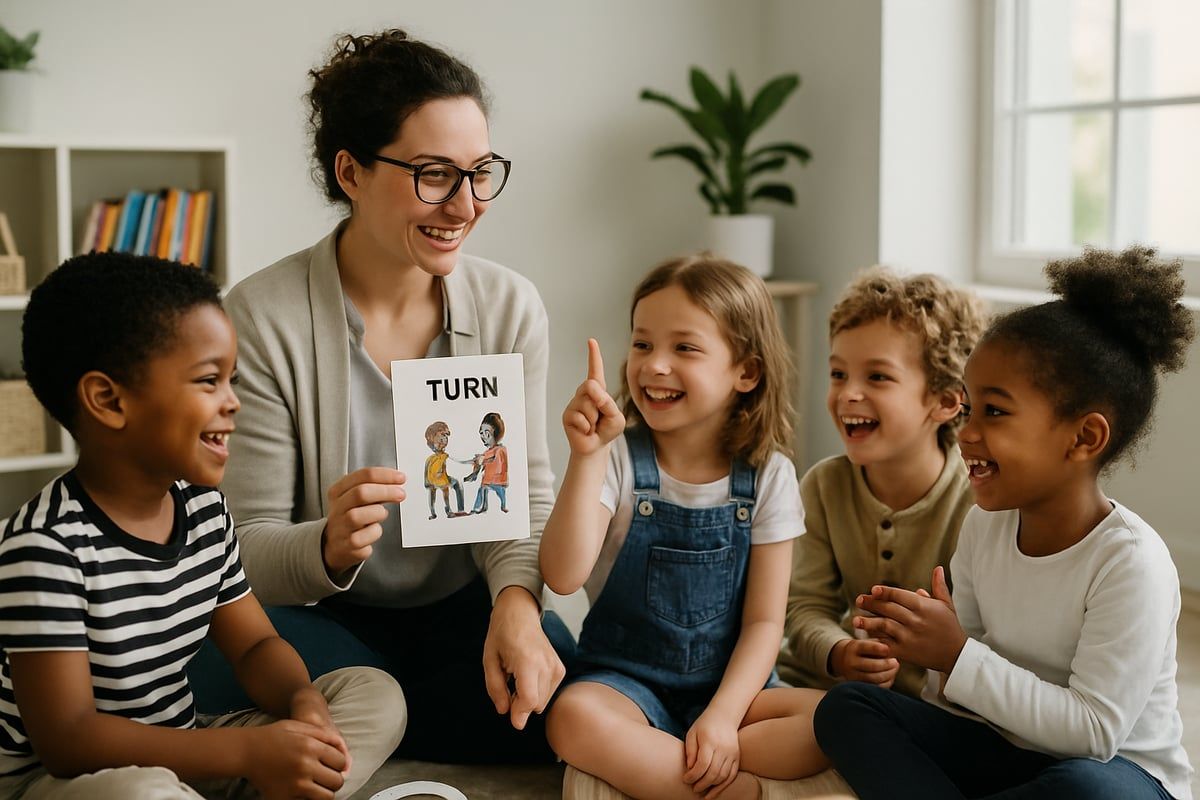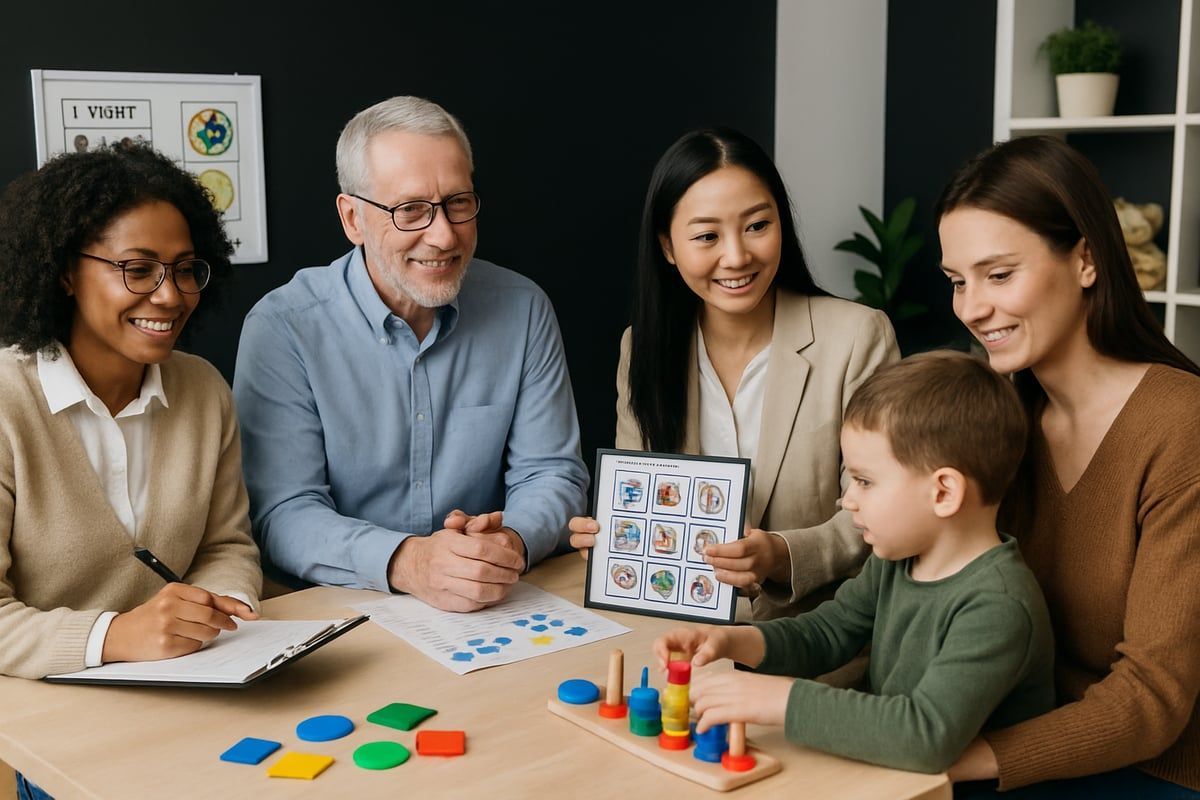In 2025, social skills are more important than ever for children navigating a rapidly changing world. Kids with autism or developmental differences may face unique challenges, making targeted support essential.
Applied Behavior Analysis (ABA) is widely recognized for its effectiveness in teaching aba social skills. Strong social skills help children build confidence, make friends, succeed in school, and gain independence.
This article explores seven essential, up-to-date ABA social skills activities for kids in 2025. Each strategy is crafted to be practical, engaging, and effective for parents, educators, and therapists alike.
Understanding ABA and Social Skills Development
Helping children thrive socially starts with understanding how evidence-based methods like aba social skills training work. ABA, or Applied Behavior Analysis, is a flexible and science-driven approach used in homes, schools, and clinics. It is especially recognized for supporting children with autism and developmental differences.

What Is ABA Therapy?
Applied Behavior Analysis (ABA) is an evidence‑based therapy that focuses on understanding and improving behavior through positive reinforcement, structured skill‑building, and careful observation. ABA social skills interventions apply these principles to help children learn new ways to interact, communicate, and connect with others.
A Board Certified Behavior Analyst (BCBA) designs and oversees each child’s individualized plan, ensuring strategies are tailored to their unique needs. Widely recognized as the gold standard for autism intervention, ABA provides structure while remaining flexible across home, school, and clinical environments. For a deeper dive into the foundational principles, explore the Basics of Applied Behavior Analysis.
Why Social Skills Matter for Kids in 2025
Strong ABA social skills are essential for academic success, lasting friendships, and emotional well‑being. In 2025, children face new challenges as social interactions increasingly blend digital and real‑world experiences.
Research shows that social skills predict not only classroom achievement but also long‑term life satisfaction. Children who master these abilities are more likely to thrive in peer groups and adapt to changing environments. For neurodiverse kids, including those on the autism spectrum, targeted ABA support is especially crucial for building confidence and independence.
Key Components of Social Skills in ABA
ABA social skills programs focus on five essential building blocks that support well‑rounded development:
Communication
Developing verbal and nonverbal communication, practicing active listening, and learning to express needs clearly.
Interaction
Encouraging sharing, turn‑taking, and group participation to strengthen peer relationships.
Emotional Understanding
Helping children recognize, interpret, and respond appropriately to feelings in themselves and others.
Problem‑Solving
Teaching conflict resolution, negotiation, and cooperative strategies to handle challenges effectively.
Generalization
Ensuring children can apply learned skills across different settings — at school, home, and in the community.
Together, these components create a flexible foundation that supports children in navigating diverse social situations.
How ABA Approaches Social Skills Training
ABA social skills training uses proven teaching methods such as modeling, positive reinforcement, and prompting. Complex skills are broken down into manageable steps, making learning less overwhelming and more achievable.
Therapists track progress using data, adjusting strategies as needed to ensure growth. Collaboration with families and educators provides consistency across environments, reinforcing skills in everyday life. Many children experience measurable improvements, gaining confidence and independence as they reach new social milestones.
7 Essential ABA Social Skills Activities for Kids in 2025
Building strong ABA social skills requires more than theory — it takes hands‑on, real‑world practice. The following activities are designed to be practical, engaging, and easy to implement in 2025. Whether you’re a parent, teacher, or therapist, each activity leverages ABA methods to maximize impact and help children thrive socially now and in the future.
Role‑Playing Real‑Life Scenarios
Role‑playing is a cornerstone of ABA social skills training. Through structured scenarios, children practice greetings, sharing, asking for help, and resolving conflicts. Start with everyday situations—joining a group, apologizing after a mistake, or handling disagreements—and gradually increase complexity as confidence grows.
Props, visual cues, and role assignments make the activity engaging. Model the desired behavior first, then encourage the child to act it out. Offer specific praise or small rewards to reinforce effort and success. ABA techniques such as modeling, reinforcement, and prompt fading ensure steady progress. Research shows role‑play significantly boosts initiation and response rates in peer interactions.
Social Stories and Narratives
Social stories are personalized, visual guides that clarify social rules and reduce anxiety in new situations. In ABA social skills sessions, these narratives explain expected behaviors like making a new friend, waiting in line, or asking to play.
Include visuals—photos, drawings, or symbols—to make stories engaging. Repetition is key: read and discuss the story often, especially before entering the actual situation. Stories can be adapted for any developmental level, supporting children who struggle with transitions or routines. Evidence shows social stories improve understanding and reduce challenging behaviors in children with autism.
Peer‑Mediated Play Groups
Peer‑mediated play groups provide natural opportunities to practice ABA social skills. By pairing children with neurotypical peers, they observe, imitate, and practice behaviors like turn‑taking, sharing, and group participation.
Structured play sessions with cooperative games encourage communication and teamwork. ABA strategies such as peer modeling, guided participation, and feedback loops foster skill development. Facilitators—parents or therapists—offer gentle prompts and praise to support progress. Research links peer‑mediated instruction to improved social engagement and greater acceptance among children with autism, with skills generalizing to classrooms and community settings.
Video Modeling and Self‑Modeling
Video modeling leverages visual learning to teach ABA social skills. Children watch short clips of peers or themselves demonstrating positive behaviors, such as joining a game or responding to greetings.
Creating video models is simple: record scenarios like introducing yourself or sharing a toy, then replay for observation and imitation. Reinforce attempts with praise or rewards. This technique is especially effective for children with limited verbal skills or strong visual learning preferences. Studies confirm video modeling increases both acquisition and generalization of social skills, boosting confidence and independence.
Prompting and Fading in Group Activities
Prompting guides children through social interactions until they can act independently. Prompts may be verbal (“Say thank you”), visual (picture cues), or physical (gentle taps). In ABA social skills training, prompts are gradually faded to prevent dependency.
Apply prompting in group games, classroom routines, or outings. For example, during snack time, prompt a child to ask politely or thank a peer. Over time, fade prompts to encourage spontaneous behavior. Research shows systematic prompting and fading leads to sustained mastery and independence. Best practices include starting with the least intrusive prompt and monitoring progress closely.
Discrete Trial Training (DTT) for Social Skills
Discrete Trial Training (DTT) breaks complex ABA social skills into small, manageable steps. Each step is taught individually with clear instructions, prompts, and reinforcement, making it ideal for structured learners.
For example, teaching “initiating conversation” may begin with eye contact, progress to saying “hello,” and end with asking a question. Each trial is brief and followed by immediate feedback or rewards. DTT allows precise data collection, making it easy to track progress and adjust difficulty. Evidence supports DTT as highly effective for building foundational social skills, especially for children needing extra structure.
Natural Environment Training (NET) for Everyday Socialization
Natural Environment Training (NET) takes ABA social skills into real‑world settings like playgrounds, grocery stores, or family gatherings. Therapists and caregivers use teachable moments to reinforce spontaneous interactions, such as greeting neighbors or ordering food. NET boosts motivation and ensures skills generalize beyond therapy. Parents can support NET by identifying daily opportunities, using positive reinforcement, and involving siblings or peers. While distractions and unpredictability can be barriers, starting in familiar settings helps children succeed. With consistent practice, ABA social skills become second nature, empowering children to thrive in diverse environments.
Integrating ABA Social Skills into Daily Routines
Consistency is the secret to lasting progress. Integrating ABA social skills into daily routines makes practice feel natural rather than therapeutic. Everyday moments—morning greetings, mealtime conversations, or asking for help during homework—become opportunities for social growth.
Visual schedules and gentle reminders help children anticipate interactions and reinforce habits. Over time, daily repetition accelerates learning, making social skills part of everyday life. This integration ensures children build confidence and independence while strengthening connections at home, school, and in the community.
Making Social Skills Practice a Habit
Embedding ABA social skills into daily routines starts with repetition and predictability. Everyday tasks—like brushing teeth, setting the table, or tidying up—become opportunities to encourage social communication.
Choose one target skill, such as asking for help, and practice it at a consistent time each day. Visual schedules, checklists, or sticky notes can serve as reminders. For example, a sticky note on the fridge might prompt a child to say “good morning” to siblings. Short, consistent practice sessions help children generalize skills across settings and accelerate progress.
Family and Caregiver Involvement
Parents, siblings, and caregivers play a central role in reinforcing ABA social skills outside of therapy. Modeling turn‑taking, sharing, or conversation during family activities allows children to see social skills in action.
Parent coaching and workshops often provide families with strategies to prompt and praise social behaviors. Family game nights are another fun way to practice skills like waiting, listening, and following rules. When the whole family participates, social learning feels natural and enjoyable, increasing confidence and long‑term retention.
Collaborating with Schools and Community Settings
Children’s ABA social skills flourish when schools and communities actively support their development. Teachers and staff can integrate activities into classroom routines or social groups, while including ABA goals in IEPs ensures consistency across settings.
Participation in clubs, sports, or community events provides real‑world practice. For example, a teacher‑led social skills group or a library workshop offers safe spaces for interaction. Collaboration among families, educators, and therapists ensures children apply ABA social skills everywhere—not just in therapy sessions.
Tracking Progress and Adjusting Strategies
Monitoring progress is essential for effective ABA social skills development. Tools like checklists, journals, or digital trackers help families and therapists record which skills are practiced and how often. Regular data reviews with the therapy team highlight milestones and identify areas needing improvement. Adjusting strategies—whether by introducing new activities or modifying prompts—keeps children motivated and ensures steady growth. Tracking progress also reinforces accountability and celebrates achievements along the way.
Overcoming Common Challenges in ABA Social Skills Training
Mastering ABA social skills is not always a smooth journey. Children may face obstacles such as reluctance to engage, difficulty generalizing skills, or frustration in new environments.
By recognizing these challenges, parents, educators, and therapists can provide targeted support. Strategies like breaking tasks into smaller steps, offering consistent reinforcement, and practicing across multiple settings help children overcome barriers. With patience and collaboration, children build confidence and continue progressing toward stronger social connections.
Addressing Resistance and Building Motivation
Some children may resist ABA social skills activities due to anxiety, sensory sensitivities, or lack of interest. Identifying the root cause is the first step toward effective solutions.
Offer choices between activities to increase engagement, and use favorite toys or topics as conversation starters. Positive reinforcement—celebrating every small win—helps children feel successful and motivated. When activities reflect a child’s interests, participation improves and progress accelerates. With encouragement and adaptation, reluctance can transform into genuine enthusiasm for ABA social skills practice.
Supporting Generalization Across Settings
A common challenge in ABA social skills training is ensuring children apply new abilities in different environments. Skills learned in therapy may not automatically transfer to classrooms, playgrounds, or home routines.
Practice social behaviors in multiple settings with diverse people, and use real‑life materials to bridge the gap. Reinforce skills when they appear naturally, not only in structured sessions. Parents and teachers play a vital role by prompting and praising skill use wherever it occurs. Intentional planning—such as creating opportunities for introductions at home or in the community—helps ABA social skills stick beyond the therapy room.
Managing Group Dynamics and Peer Interactions
Group activities can be challenging for children learning ABA social skills. Turn‑taking, sharing, and conflict resolution require careful support, especially for those who are shy or easily overwhelmed.
Start with small groups and establish clear rules for each activity. Assign roles to ensure balanced participation, and monitor group composition to optimize learning. Peer‑mediated interventions, such as structured group skills games for autism, provide safe environments for practicing ABA social skills. These activities build confidence, foster friendships, and encourage meaningful peer connections.
Customizing Activities for Diverse Needs
Every child is unique, and ABA social skills activities must be tailored to individual strengths and challenges. Age, language abilities, cultural background, and sensory preferences all influence how children learn.
Use visuals or AAC devices for nonverbal children, and incorporate sensory supports when needed. Collaboration with multidisciplinary teams—including occupational therapists and speech‑language pathologists—ensures a holistic approach. Flexibility allows every child to access and benefit from ABA social skills instruction. For more adaptation strategies, explore ABA Skills for Children, which offers practical tips for diverse learners.
Future Trends in ABA Social Skills Activities for 2025 and Beyond
The future of ABA social skills training is rapidly evolving. Innovations in technology, inclusive practices, self‑advocacy, and community engagement are reshaping how children develop vital social abilities.
Emerging tools such as interactive apps, virtual reality role‑play, and AI‑driven progress tracking are making social skills practice more engaging and personalized. Inclusive approaches emphasize peer collaboration and cultural sensitivity, while self‑advocacy training empowers children to express needs confidently. Community‑based programs further extend learning beyond therapy, ensuring ABA social skills are reinforced in everyday life.
Technology‑Enhanced ABA Activities
Digital tools are transforming ABA social skills learning in 2025. Apps, video modeling, and even virtual reality are now integrated into therapy sessions, offering interactive and motivating experiences for children.
Therapists use tablets to create custom video models, allowing kids to watch and imitate social behaviors. Virtual reality scenarios provide safe spaces to practice greetings, turn‑taking, and problem‑solving. Many ABA activities for kids now include digital resources, making it easier for families to reinforce skills at home. Benefits include real‑time feedback, progress tracking, and increased engagement. When selecting technology, choose tools that are user‑friendly and customizable to each child’s needs.
Culturally Responsive and Inclusive Approaches
Inclusivity is central to modern ABA social skills programs. Therapists adapt activities to reflect children’s cultural, linguistic, and family backgrounds, ensuring relevance and respect.
Social stories and video models now highlight diverse holidays, languages, and traditions. For example, a child may practice greetings in their home language or role‑play scenarios around cultural celebrations. Representation in materials fosters belonging and boosts participation.
Collaboration with families ensures ABA social skills activities are meaningful and respectful. Inclusive practices have been shown to improve outcomes for all children.
Emphasis on Self‑Advocacy and Emotional Regulation
A major trend in ABA social skills for 2025 is empowering children to express needs and manage emotions. Self‑advocacy skills—such as asking for a break, saying “no,” or expressing discomfort—are now woven into social curricula.
Therapists use activities that build emotional awareness, including recognizing feelings with visuals and practicing calming strategies. Children learn to set boundaries and communicate preferences, building confidence for real‑world situations.
Research links self‑advocacy to long‑term independence. Integrating emotional regulation into ABA social skills instruction equips children with tools for navigating both social interactions and personal challenges.
Expanding Community and Peer Involvement
Community partnerships are creating new opportunities for ABA social skills practice beyond therapy. In 2025, therapists collaborate with local organizations, sports teams, and libraries to host inclusive workshops and clubs.
Peer‑mediated activities, such as structured turn‑taking games, help children build friendships and practice cooperation in natural settings. These experiences foster confidence, social competence, and lasting peer connections.
Families are encouraged to participate in community events and support groups. With consistent involvement, children gain real‑world experience, strengthen networks, and develop meaningful friendships.
Partnering with Silveira Behavior Consultants
At Silveira Behavior Consultants, we believe every child deserves to feel confident, connected, and independent—whether at home, school, or in the community. Our personalized ABA therapy services are designed to fit your family’s unique needs, making growth and meaningful engagement part of everyday life.
If you’re ready to explore how these strategies can support your child, we’re here to help. Inquire About Services today and take the next step toward empowering your child with practical, evidence‑based ABA social skills activities.





